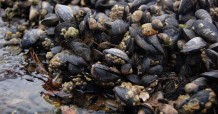Articles

Mussel mariculture.
Devon company leading the way in offshore mussel farming
Sustainable growth in marine aquaculture (mariculture), involving the farming of seaweeds, shellfish and finfish, will be essential in helping to provide global food security for the ever expanding human population. Global food fish production from aquaculture (82 million tonnes, US$250 billion per year) now exceeds capture fisheries and production is projected to rise to 109 million tonnes, by 2030 (FAO, 2020). Especially strong growth is expected in marine aquaculture (FAO, 2020), including in the UK, which currently contributes just 0.5% to global aquaculture production. In the UK, there is potential to grow mariculture in less congested offshore areas, and here companies like Offshore Shellfish are leading the way
Shellfish and seaweed mariculture are highly sustainable in that they utilise natural sunlight, available nutrients and/or marine planktonic microalgae, benefiting directly from the high net primary productivity of coastal waters (of up to 1900 g C/m2/yr) (Malone et al., 2016), which is similar to that of tropical rainforests (Malhi et al., 2015). Nutrient removal by seaweeds and shellfish help curb eutrophication, and in EU coastal waters alone the contribution of shellfish to this service is valued at €11–17 billion per year (Ferreira et al., 2009). Seaweed and shellfish mariculture may also contribute to climate change mitigation. There are various estimates for potential benefits relating to carbon sequestration, but even for the worst case scenario of being carbon neutral, this is an overwhelmingly better position than that for land based meat production systems.
Realising targets for sustainable growth in mariculture food production, and delivery of the many additional environmental benefits (externalities) is not a given, but requires a more integrated approach to resource management, including marine spatial planning and holistic catchment-wide approaches for management of water quality, on which all forms of aquaculture depend.
Through the ground-breaking research programme of the South West Economic and Environmental Prosperity (SWEEP) partnership, the Universities of Exeter, Plymouth and Plymouth Marine Laboratory are supporting the sustainable development of mariculture in SW England. For more detail, see SWEEP's aquaculture and sustainable seafood work.
References
FAO (2020). The State of World Fisheries and Aquaculture 2020. Food and Agriculture Organization of the United Nations (UN FAO), Rome. 224 pp - http://www.fao.org/state-of-fisheries-aquaculture
Ferreira JG et al. (2009) Analysis of coastal and offshore aquaculture: application of the FARM model to multiple systems and shellfish species. Aquaculture 292: 129–138. https://doi.org/10.1016/j.aquaculture.2008.12.017
Malhi Y et al. (2015). The linkages between photosynthesis, productivity, growth and biomass in lowland Amazonian forests Glob. Change Biol. 21 2283–95. https://doi.org/10.1111/gcb.12859
Malone T et al. (2016). Primary production, cycling of nutrients, surface layer and plankton. Chapter 6 in United Nations First Global Integrated Marine Assessment (First World Ocean Assessment). https://www.un.org/Depts/los/global_reporting/WOA_RegProcess.htm
Date: 20 November 2020
